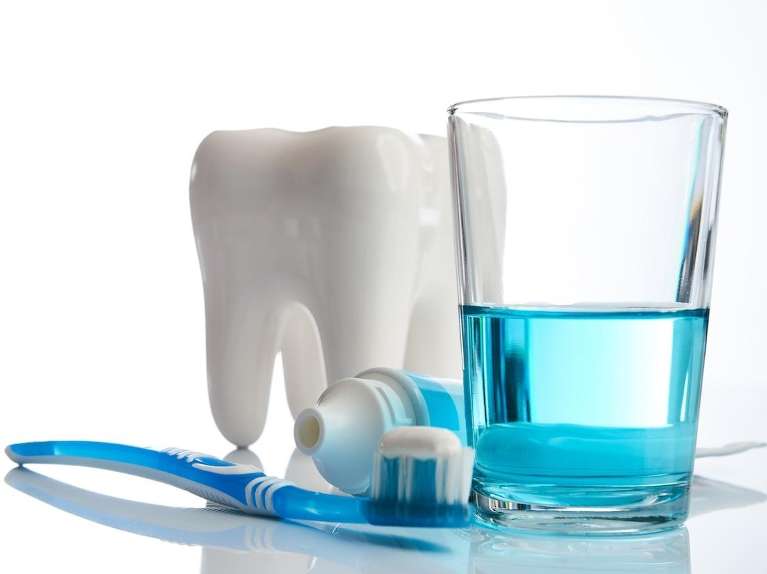
Just had your wisdom teeth extracted? Congratulations on taking care of those pesky third molars! While you might be relieved to have them gone, the recovery process requires some special attention to your oral hygiene. Brushing and flossing are crucial, but what about mouthwash? Can it help keep your breath fresh after wisdom tooth extraction, or should you avoid it altogether?
This blog dives deep into the world of mouthwash and wisdom tooth extraction aftercare. We’ll explore how mouthwash can be beneficial, the potential risks involved, and alternative methods for maintaining oral hygiene during this critical healing period.
How Can Mouthwash Help?
Mouthwash offers several benefits for overall oral health, including:
Reducing bacteria:
Mouthwash contains ingredients that target bacteria in the mouth, helping to reduce plaque buildup and freshen breath.
Soothing irritation:
Some mouthwashes contain mild anesthetics that can temporarily numb discomfort in the mouth.
Reducing inflammation:
Certain mouthwashes have anti-inflammatory properties that can help ease swelling and irritation after oral surgery.
However, it’s important to remember that not all mouthwashes are created equal, and some may not be suitable for use after wisdom tooth extraction.
What to Do After a Tooth Extraction
Following wisdom tooth extraction, your dentist will provide specific instructions on caring for your mouth. These typically include:
- Bleeding control: You’ll likely experience some bleeding after surgery. It’s common and will pass in a few hours. Apply gentle pressure with gauze pads to control bleeding.
- Pain management: To help you feel less uncomfortable, your dentist may recommend painkillers.
- Diet restrictions: Stick to soft foods for the first few days to avoid disturbing the extraction site.
- Brushing and flossing: Gentle brushing and flossing are crucial for removing food debris and bacteria. However, be extra careful around the extraction site.
Mouthwash and Wisdom Tooth Extraction: A Delicate Balance
While mouthwash offers potential benefits for oral hygiene, it’s essential to use caution after wisdom tooth extraction. Here’s why:
Dislodging the blood clot:
A blood clot forms at the extraction site to promote healing. Rinsing vigorously with mouthwash can dislodge this clot, leading to prolonged bleeding, delayed healing, and a condition called dry socket, which can be quite painful.
Alcohol-based mouthwashes:
Many mouthwashes contain alcohol, which can irritate the sensitive extraction site and potentially hinder healing.
So, Can You Use Mouthwash After Wisdom Tooth Extraction?
The answer depends on the timeframe and type of mouthwash:
- First 48 hours:
Avoid using mouthwash altogether during this critical period to allow the blood clot to form and solidify.
- After 48 hours:
If your dentist gives the green light, you can consider using a specific type of mouthwash:
Alcohol-free mouthwash:
Opt for a gentle, alcohol-free mouthwash with a mild antiseptic like chlorhexidine gluconate (CHG). This can help reduce bacteria without the harsh effects of alcohol.
Saltwater rinse:
A simple saltwater rinse made with warm water and a teaspoon of salt is a safe and effective way to cleanse your mouth and promote healing. Swish gently for 30 seconds and spit.
Here are some additional tips for maintaining fresh breath after your tooth extraction:
- Brush gently: Use a soft-bristled toothbrush and gentle brushing technique, especially around the extraction site.
- Floss carefully: Use floss threaders or soft picks to clean between teeth without disturbing the extraction site.
- Stay hydrated: Drink plenty of fluids to keep your mouth moist and aid healing.
- Maintain a healthy diet: Stick to soft, non-acidic foods that won’t irritate the extraction site.
Partnering with Your Dentist for Optimal Recovery
Remember, your dentist is your best resource for post-operative care after tooth extraction. They’ll provide specific instructions tailored to your individual needs and monitor your healing progress. Please feel free to voice any issues or ask questions you may have.
For residents in the Encino area, consider scheduling a consultation with a trusted Encino dentist to discuss wisdom tooth extraction and post-operative care. They’ll guide you through the entire process and ensure a smooth recovery.
By following these guidelines and consulting with your dentist, you can ensure optimal healing and maintain fresh breath after wisdom tooth extraction. Remember, patience and proper oral hygiene are key to a speedy and comfortable recovery.
No, avoid using mouthwash altogether for the first 48 hours following wisdom tooth extraction. This allows the blood clot at the extraction site to form and solidify, which is crucial for healing. Rinsing vigorously with mouthwash during this time can dislodge the clot, leading to complications.
If your dentist gives the okay after 48 hours, opt for a gentle, alcohol-free mouthwash containing chlorhexidine gluconate (CHG). This provides mild antiseptic properties without the irritation of alcohol. Alternatively, a simple saltwater rinse made with warm water and salt is a safe and effective way to cleanse your mouth.
Here are some alternative methods for keeping your breath fresh during wisdom tooth extraction recovery:
Gentle brushing: Use a soft-bristled toothbrush and gentle technique, especially around the extraction site.
Careful flossing: Employ floss threaders or soft picks to clean between teeth without disturbing the area.
Hydration: Drink plenty of fluids to keep your mouth moist and promote healing.
Healthy diet: Stick to soft, non-acidic foods that won’t irritate the extraction site.